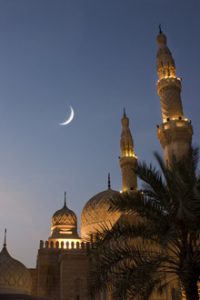By Editorial Staff
The true meaning of worship is achieved through the true submission and obedience to Allah’s commands. This is very obvious here, but how?؟
When it is obligatory to fast, Muslims hasten to obey Allah through observing it. Also, when it is forbidden to fast, they do not. This article highlights those days on which fasting is prohibited.

When it is obligatory to fast, Muslims hasten to obey Allah through observing it. Also, when it is forbidden to fast, they do not.
What are the days on which fasting is prohibited?
1. Eid al-Fitr (festival of fast-breaking)
This festival marks the end of Ramadan and based on proofs from the Sunnah, it lasts only for the first day of Shawwal, the 10th month in the lunar calendar. Traditionally, it can last for up to three days.
2. Eid al-Ad-ha (festival of sacrifice)
This is the Muslims’ second festival that marks the end of the most important pillar of the pilgrimage to Makka (mecca), namely, standing on Arafat. It lasts only for the 10th day of Dhul-Hijjah, the 12th month in the lunar calendar. Usually, it can last for up to four days. The three days that follow the first day of the festival will be discussed below.
Scholars unanimously agree on the prohibition of fasting on those two days, that is, Eid al-Fitr and Eid al-Ad-ha. Moreover, celebrating on these two days is an act of worship as long as acts of disobedience are avoided. This is supported by the proof from the Sunnah:
Abu Sa’id Al-Khudri (RAA) narrated. ‘The Messenger of Allah (ﷺ) has prohibited fasting on two days; the Day of Fitr (breaking the fast of Ramadan) and on the Day of sacrifice (‘Eid al-Ad-ha).’ (Al-Bukhari and Muslim)
3. The days of Tashriq
These are the 11th, 12th and 13th days of Dhul-Hijjah. It is also prohibited to fast on these days except for the pilgrim who cannot offer a sacrifice.
‘A’isha and lbn ‘Umar (RAA) narrated, ‘Nobody was allowed to fast on the days of Tashriq except for those, who could not afford the Hadi (sacrifice).’ (Al-Bukhari)
Nubaishah Al-Hudhali (RAA) narrated that The Messenger of Allah (ﷺ) said:
“The days of Tashriq (the three days following ‘Idul Ad-ha, i.e. 11th , 12th and 13th of Dhul Hijjah) are days of eating, drinking and remembering (dhikr) of Allah, the Most Great and Glorious.” (Sahih Muslim)
4. The day of doubt
This is the 30th day of Sha’ban, the 8th month in the lunar calendar.
On the 29th night of Sha’ban, it is sometimes impossible or to see the new moon. This makes people doubt the beginning of Ramadan and whether the following day is the 30th of Sha’ban or the first day of Ramadan. That’s why it is called “the day of doubt”.
According to the opinion of the majority of scholars, Muslims are allowed to fast only if the sight of the new moon is proven.
Scholars differ on whether fasting on this day is reprehensible or prohibited. The preferred opinion is that it is prohibited to fast on the day of doubt. This is in agreement with the meaning of the following hadith:
‘Ammar ibn Yasir said: “Whoever fasts on the day concerning which there is doubt has disobeyed Abul-Qasim (Prophet Muhammad, peace and blessings of Allaah be upon him).” Al-Bukhary related this Hadith as Mu’allaq1 (Suspended).
However, fasting on this day is only allowed if it happens to be on the usual days a person usually fasts. For example, the person observing fasting on Mondays and Thursdays is allowed to fast on the day of doubt if it happens to be on Monday or Thursday.
1: Mu’allaq Hadith is a hadith in which one or more narrators is removed from the beginning of the isnad i.e the chain of narration. Scholars consider Mu’allaq hadiths found in Sahih Al-Bukhary to be authentic.
 Arabic
Arabic English
English Spanish
Spanish Russian
Russian Romanian
Romanian Hindi
Hindi Tagalog
Tagalog Bengali
Bengali Sinhalese
Sinhalese Nepali
Nepali

